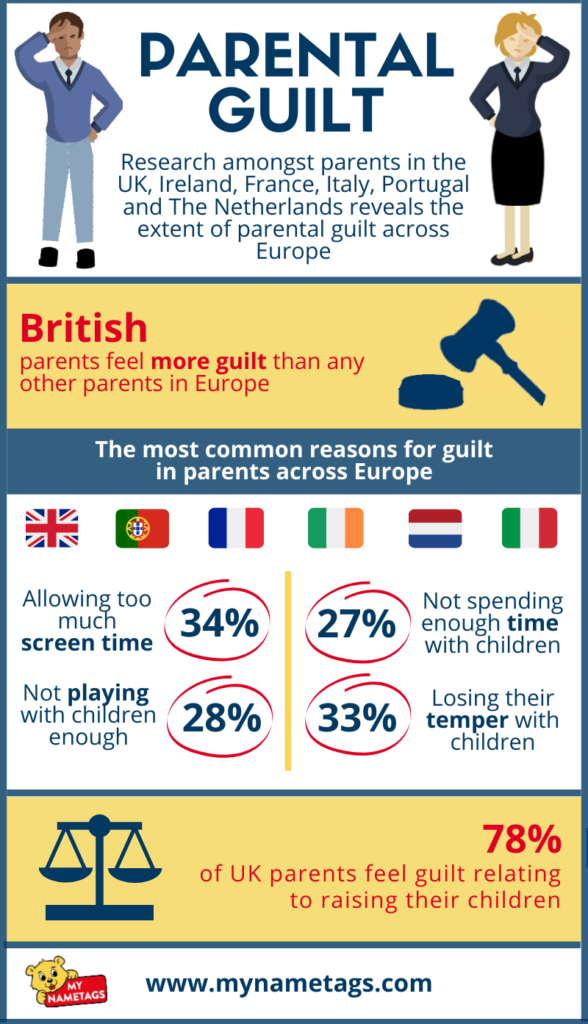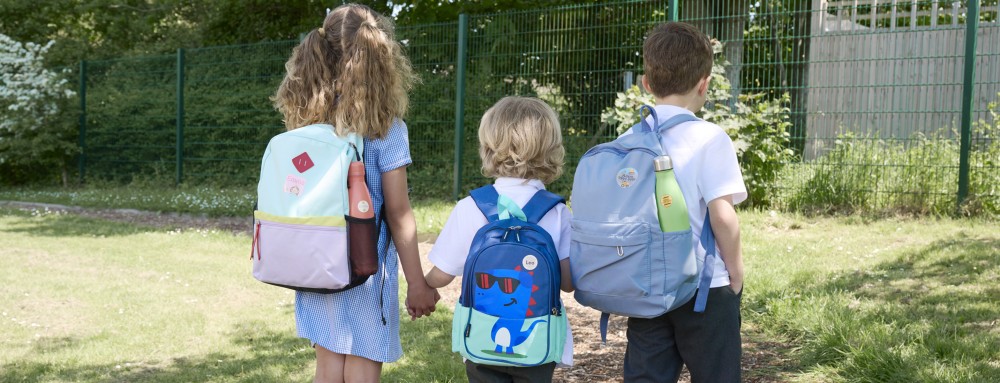
Raising a child is no mean feat and we know that the pressures of parenting can lead to feelings of guilt. With the current global situation presenting families with new and unfamiliar challenges, we were interested to explore the concept of parental guilt and how this varies amongst our customers across the world.
We surveyed over 2,000 mums and dads in the UK, Ireland, the Netherlands, France, Italy, and Portugal to discover how parents in each region experience parental guilt. To our surprise, we found that British parents are afflicted by more guilt than any other parents in Europe, with an incredible 78 percent of parents in the UK feeling guilty in relation to raising their child.
What’s more, this feeling is experienced often, with the average British parent feeling guilty twice every day on average. This equates to a whopping 50 times per month or 595 times per year.
The most common causes of parental guilt in the UK
- Letting children have much screen time (42 percent)
- Not spending enough time with their children (33 percent)
- Not playing with them enough (32 percent)
- Not cooking from scratch (26 percent)
- Not seeing their children enough due to working long hours (25 percent)
Comparing the nations
This contrasts to attitudes towards parenting elsewhere in Europe, with Irish parents most likely to feel guilty about not organising enough hobbies for their children and French and Italian parents more likely to regret not arranging play dates with other parents.
Sweating the small stuff
The research found that Brits also sweat the small stuff, with many reporting feeling guilty about not mending their children’s clothes when they get damaged, writing their children’s name in their clothing instead of sewing in a name label, and getting caught on their smartphone when they are with their children.
Analysing this further
Interestingly, our study found that this guilt is often disproportionate, with many parents feeling guilty about things they know don’t genuinely impact their children negatively. For example, while almost half of British parents feel guilty about losing their temper with their youngsters, only 38 percent believe this actually affects their child’s wellbeing.
The influences
When asked what influences the pressures they put upon themselves, parents across Europe agreed that the number one factor was their own perception of what makes the perfect parent. However, there are a host of contributing factors, with British parents also heavily influenced by society’s expectations, how their parents raised them and how other parents might perceive them.
By contrast, Italian and Dutch parents are far more concerned about the wider community’s opinion of them, while Portuguese parents are conscious of their employer’s perception.
What the experts say
Commenting on the findings, Parenting Expert Bea Marshall commented: “Guilt is common among all parents and yet it actually makes it harder for us to parent in the ways we aspire. Guilt stems from our fears that how we raise our children may impact their futures. These may be fears about physical and mental health, relationships and social success or financial independence. Our worries may also be related to what others think of us and our children.
“There is no such thing as a perfect parent and fears that we are falling short lead to guilt. The differences we see between men and women are likely due to multiple factors, such as differences in parenting responsibilities and professional commitments, but also due to the different ways men and women navigate parenting. Women often carry a full mental load leading to constant thinking and emotional responses. Men are more likely to think about, and act on, one thing at a time leading to a smaller emotional response.”
The impact of COVID-19 on parental guilt
With current COVID-19 restrictions placing families under more pressure than ever before, these levels of guilt are at an all-time high. In fact, almost three quarters of UK parents are feeling additional guilt due to the lockdown measures. This is often due to how bored their children are (31 percent), not letting their children spend time with relatives (26 percent), keeping them indoors (26 percent), and not home schooling them properly (25 percent).
Conclusion
It was fascinating to find that parents from all countries feel guilty about a huge range of things, from not spending enough time with their youngsters, through to seemingly less significant things, like not ironing their clothes.
We hope that our research highlights that parents shouldn’t be so hard on themselves, and that opting for convenience, such as using stick-on name labels or cooking using pre-prepared ingredients, will not have an negative impact on their children but may save an awful lot of stress.
Let us know what you think of the research! Tweet @MyNametags or visit our Facebook page to join the conversation.



